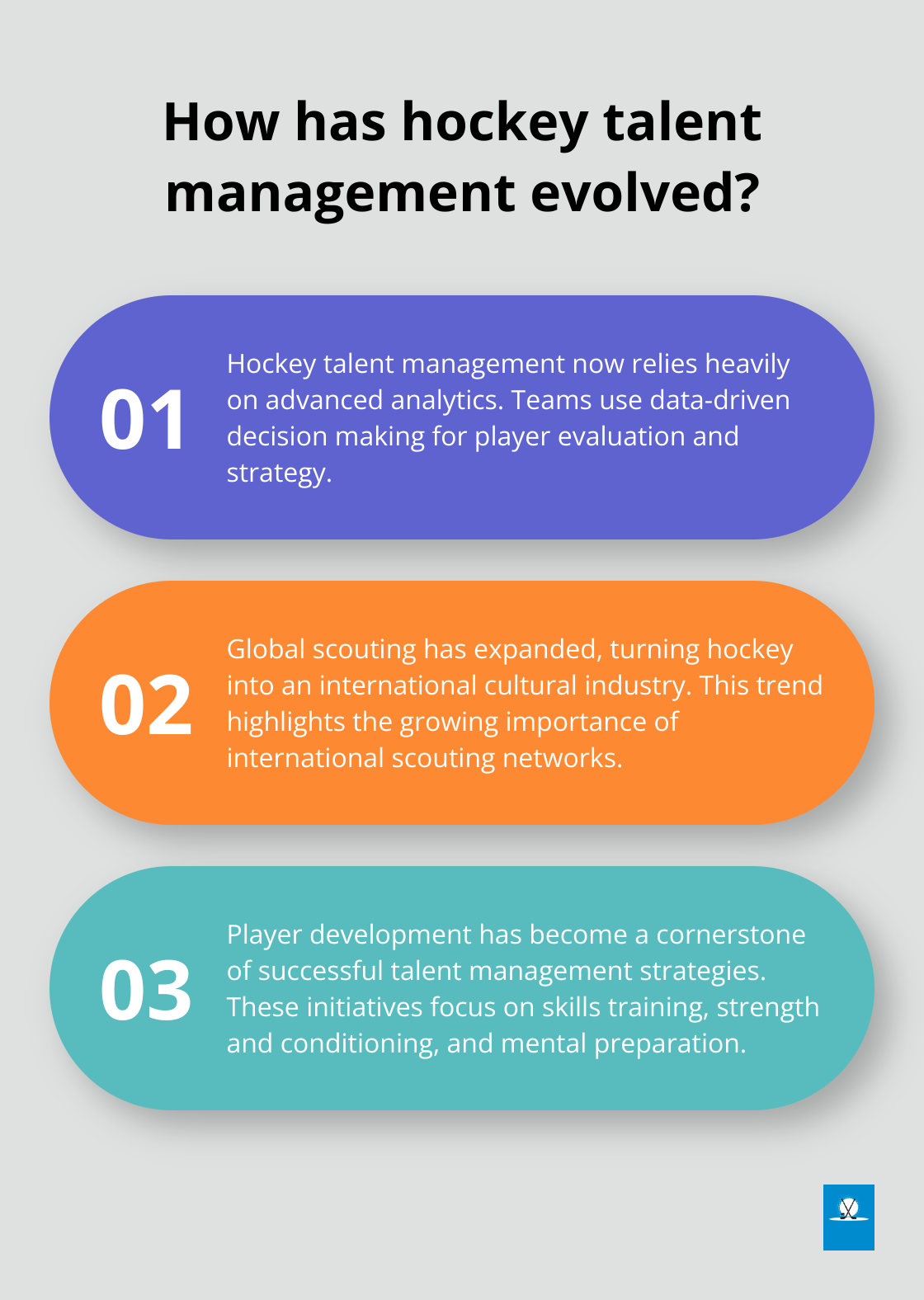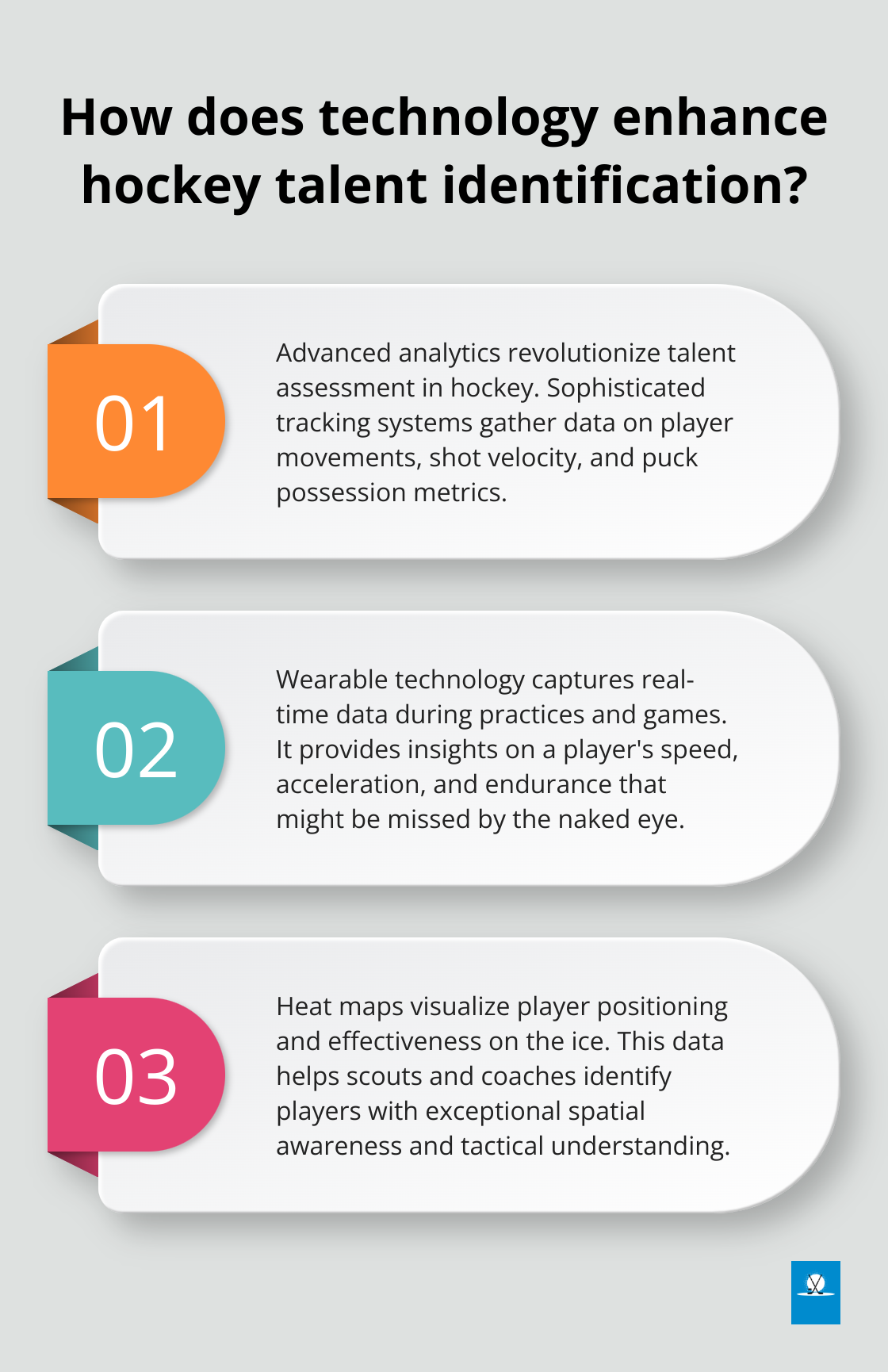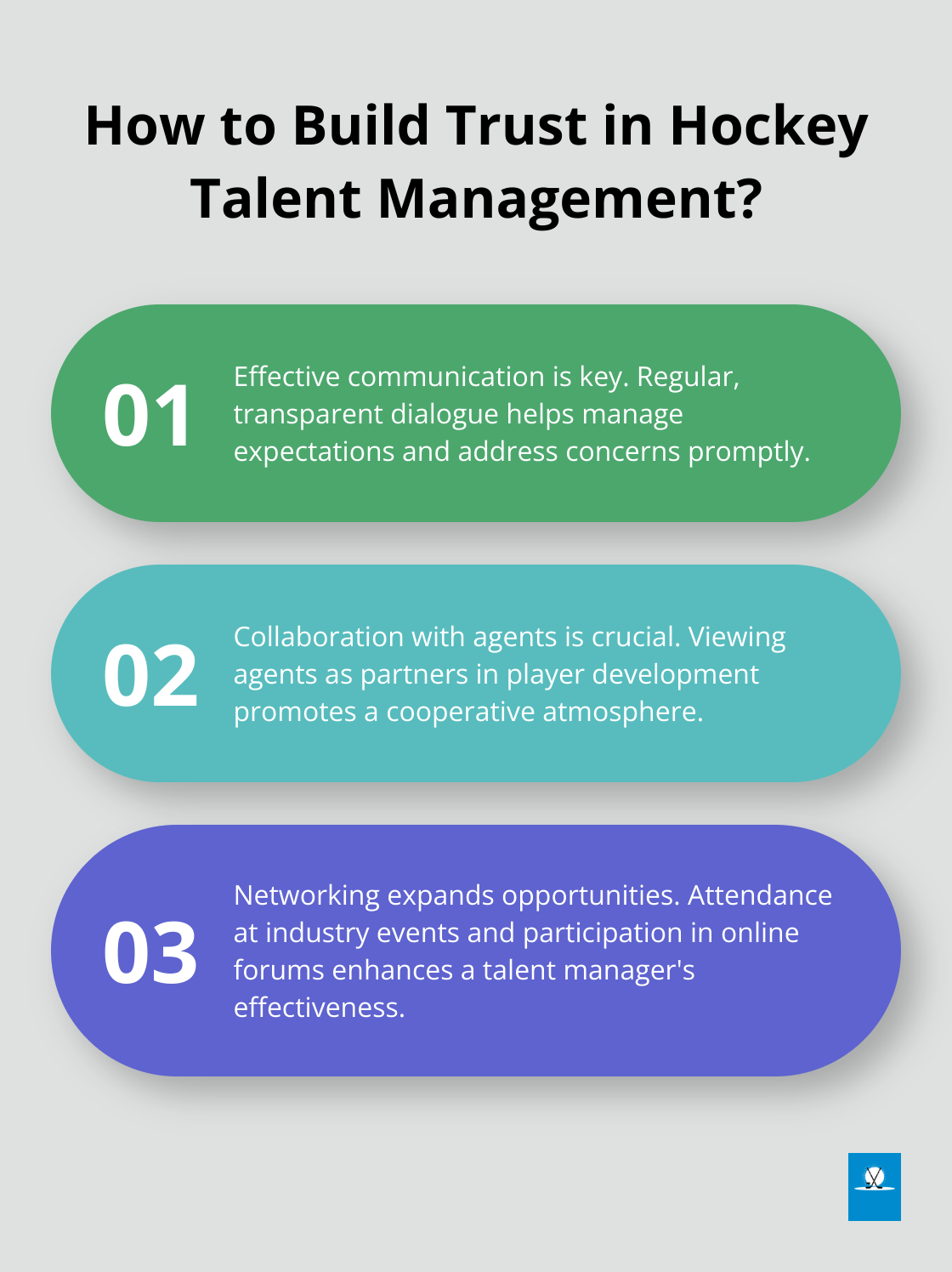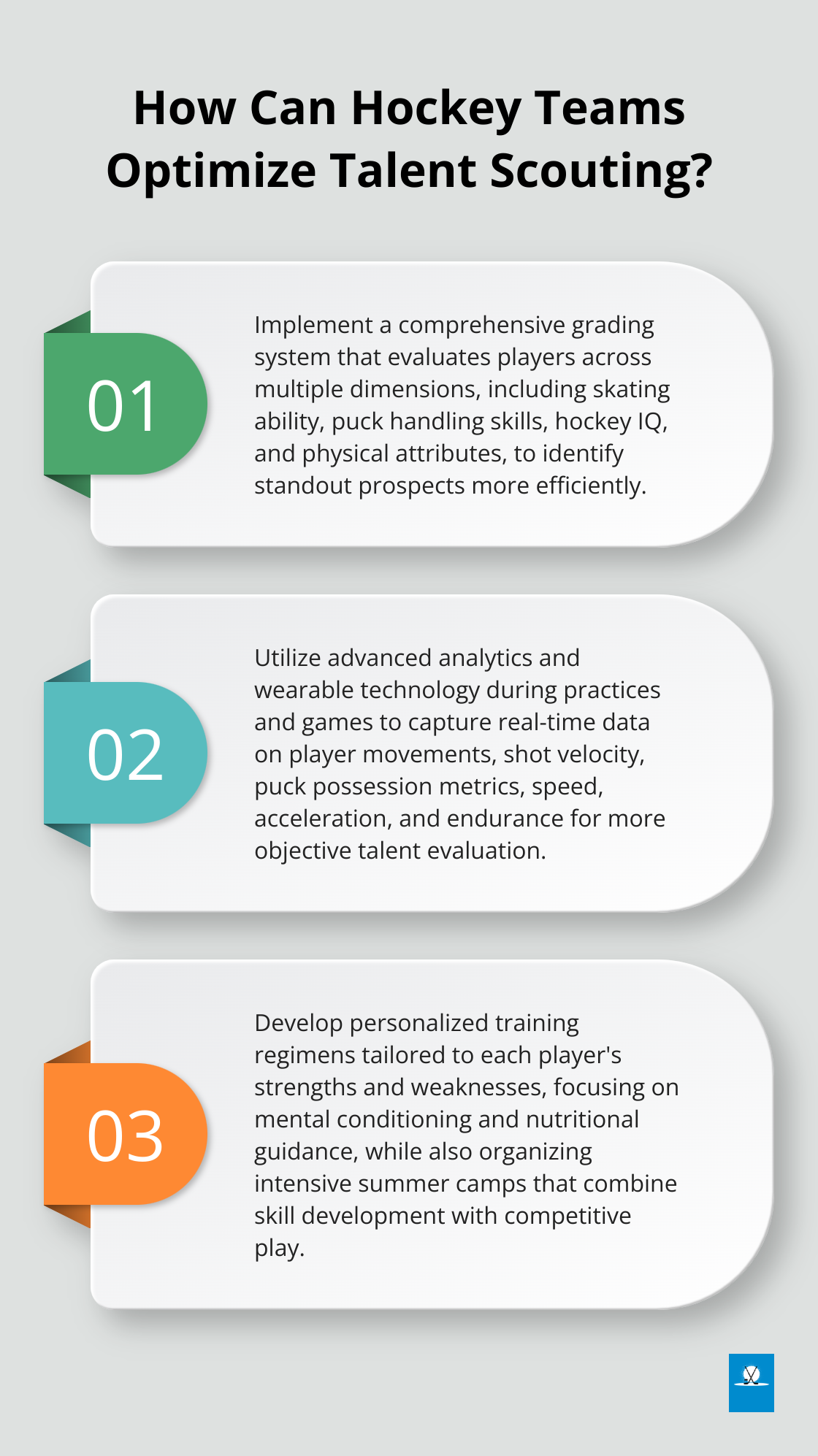Hockey talent management is a complex and ever-evolving field that demands expertise and strategic thinking. In today’s competitive landscape, identifying and nurturing top-tier players has become more crucial than ever.
At Pro Hockey Advisors, we understand the intricacies of this process and the impact it has on team success. This blog post will explore key strategies and best practices to excel in hockey talent management, from scouting techniques to building strong industry relationships.
The Evolving Landscape of Hockey Talent Management
Data-Driven Decision Making
Hockey talent management has transformed rapidly, propelled by technological advancements and changing player demographics. Teams now rely heavily on advanced analytics to evaluate player potential and performance. Analytics has revolutionized the roles of coaches and scouts in talent evaluation and team preparation. Coaches now rely on advanced metrics to make informed decisions about player performance and strategy.
Global Scouting Expansion
The globalization of talent scouting marks a significant trend in hockey talent management. Hockey’s commodification has led to its evolution into an international cultural industry with several interconnected economic characteristics. This trend underscores the growing importance of international scouting networks.
Investment in Player Development
Player development has become a cornerstone of successful talent management strategies. These initiatives focus on skills training, strength and conditioning, and mental preparation (essential components for nurturing well-rounded athletes).
Key Stakeholders in the Process
Effective talent management involves a complex network of stakeholders. Players form the core, supported by their families and agents. Teams employ scouts, coaches, and front office personnel to identify and nurture talent. The NHL and other governing bodies set regulations and standards for player recruitment and development.

Agents wield increasing influence in the talent management process. They negotiate contracts and play a significant role in guiding players’ career decisions.
The Impact on Team Performance
Effective talent management significantly influences team success both on and off the ice.
The financial implications of strong talent management are substantial. Teams with robust development pipelines can save millions in free agency by promoting from within.
In this competitive landscape, organizations that provide expertise and industry connections play a vital role. They help players, agents, and teams navigate the complex world of hockey talent management, ensuring informed decisions and maximized potential.
As we move forward, we’ll explore specific strategies for identifying and nurturing hockey talent, including scouting techniques and the use of data analytics in player assessment.
Mastering Hockey Talent Identification
The Art and Science of Scouting
Effective scouting combines a keen eye for talent with a deep understanding of the game. Scouts focus on key performance indicators such as skating ability, puck handling skills, hockey IQ, and physical attributes. They also assess intangibles like work ethic, leadership qualities, and adaptability.

A comprehensive grading system evaluates players across multiple dimensions. This system allows for consistent comparisons and helps identify standout prospects more efficiently.
Technology in Talent Assessment
Advanced analytics have revolutionized talent assessment in hockey. This chapter introduces some known advanced statistics and methods which try to explain and evaluate ice hockey players’ performance. Sophisticated tracking systems gather data on player movements, shot velocity, and puck possession metrics. This data provides a more objective evaluation of a player’s performance and potential.
Wearable technology during practices and games captures real-time data on a player’s speed, acceleration, and endurance, offering insights that might be missed by the naked eye.
Developing Future Stars
Identifying talent is only the first step. Nurturing that talent is equally important. A holistic approach to player development goes beyond on-ice skills.
Effective development programs focus on:
- Personalized training regimens tailored to each player’s strengths and weaknesses
- Mental conditioning to build resilience and improve decision-making under pressure
- Nutritional guidance to optimize physical performance and recovery
Intensive summer camps that combine skill development with competitive play provide valuable exposure to different playing styles and help young players adapt to higher levels of competition.
Data in Player Evaluation
Data analytics has become an indispensable tool in talent assessment. Various statistical models evaluate player performance and project future potential.
The sGAA (standardized Goals Above Average) model is used in hockey analytics. However, specific details about its application in player evaluation are not available from the provided search results.
Heat maps visualize player positioning and effectiveness in different areas of the ice. This data helps scouts and coaches identify players with exceptional spatial awareness and tactical understanding.
Balancing Potential and Performance
While data provides valuable insights, it’s crucial to balance analytics with traditional scouting methods. Watching players in person (often multiple times) allows scouts to assess intangibles that may not be captured by statistics alone.
A comprehensive player profile combines quantitative data with qualitative assessments from experienced scouts. This holistic view helps teams make more informed decisions about player acquisition and development.
In the dynamic world of hockey talent management, staying ahead requires a blend of time-tested techniques and cutting-edge analytics. The next chapter will explore how to build and maintain strong relationships within the hockey industry, an essential aspect of successful talent management.
Building Trust in Hockey Talent Management
Effective Communication with Players and Families
Open communication forms the bedrock of successful hockey talent management. Regular, transparent dialogue helps manage expectations, address concerns promptly, and create a supportive environment for player growth. This approach underscores the importance of clear, consistent communication channels between talent managers, players, and their support networks.
Collaborating with Agents
Working with agents requires a balance of professionalism and mutual respect. Successful talent managers view agents as partners in player development rather than adversaries. This mindset promotes a cooperative atmosphere that benefits all stakeholders. Acknowledging this reality and working constructively with agents can lead to more favorable outcomes for teams and players alike.
Expanding Professional Networks
Networking within the hockey industry unlocks valuable opportunities and insights. Attendance at industry events, participation in online forums, and maintenance of relationships with former colleagues can significantly enhance a talent manager’s effectiveness.
Building Long-Term Relationships
Trust forms the foundation of lasting relationships in hockey talent management. Consistent follow-through on commitments, transparency in dealings, and genuine interest in player development contribute to building this trust. A recent study aimed to analyze the discriminant validity of a multi-dimensional talent identification testing protocol in competitive ice hockey, highlighting the importance of comprehensive approaches in talent management.
Leveraging Technology for Relationship Management
Modern technology offers tools to streamline relationship management in hockey talent management. Customer Relationship Management (CRM) systems can help track interactions, set reminders for follow-ups, and store important information about players, agents, and other stakeholders. Utilizing these tools (in conjunction with personal touch) can enhance the efficiency and effectiveness of relationship-building efforts.

Final Thoughts
Hockey talent management requires a multifaceted approach that blends traditional scouting with cutting-edge analytics. The field evolves rapidly, with data-driven decisions and global scouting networks becoming increasingly important. Effective strategies now encompass player identification and comprehensive development programs that nurture physical skills and mental resilience.

Technological advancements will shape the future of hockey talent management. Artificial intelligence may play a larger role in player evaluation, while the globalization of hockey talent will necessitate more robust international scouting networks. We expect an increased focus on player well-being and mental health as integral components of talent development programs.
In this complex environment, expert guidance can make a significant difference. Pro Hockey Advisors offers specialized consulting services to help players, agents, and teams navigate the intricacies of hockey talent management. With our deep understanding of the industry (and access to extensive professional networks), we provide valuable insights and strategies to optimize careers and ensure long-term success in professional hockey.


